Dating and disability: Readers' stories
- Published
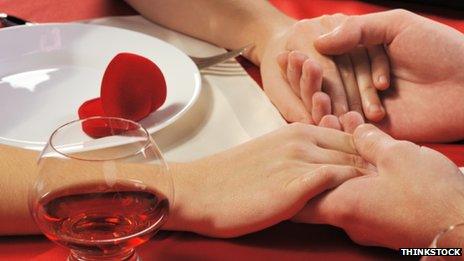
The world of disability and dating is explored in a Channel 4 series, The Undateables - and a BBC News Magazine feature on the subject generated a huge response.
Here, readers affected by the issue share their experiences.
Mags, Durham, UK
I have bipolar disorder. Often I've had potential relationships or dates collapse, not because the person I'm out with reacts badly to my disability, but because I'm too ashamed to tell them.
I break it off with them rather than come clean. I think it's the same with a lot of people with mental disabilities. We're too afraid of being seen as crazy or unstable, or as someone who will have to be cared for by our partners. It's easier not to enter into a relationship.
Nina, London, UK
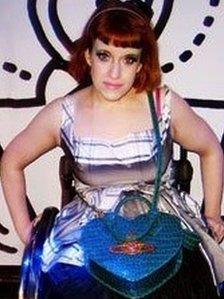
Nina believes it's not just disabled daters who have to deal with superficial attitudes
Programmes like these are really scary, because they actually create the idea that disabled people are "undateable" for able-bodied people and put a social pressure on them to hold on to that idea, while at the same time shaping disabled people's way they see themselves, lowering their self-esteem.
Personally, I was born with spina bifida [a birth defect affecting the spine] and am a wheelchair user. I have the most amazing boyfriend.
I did not have many relationships in my life but good ones, because I think my disability is actually a marker that keeps away stupid guys or, most often, makes them act even more stupid, so that I instantly know to keep away.
I have learned to stay away from people who just see me as "the wheelchair", but I guess many people, both disabled or able-bodied have to deal with people who are only interested in them superficially.
I do genuinely believe that there are people out there for almost everyone who see them as they are, whether disabled or not.
Helen, London, UK
Since being diagnosed with bipolar disorder six years ago I've only had one relationship.
Where a disability is physical it can't be hidden as easily but I find that as soon as I tell people I have a severe mental illness they run a mile.
It will take some time for the stigma of mental illness to be diminished.
Paul Lewis, Yeovil, UK
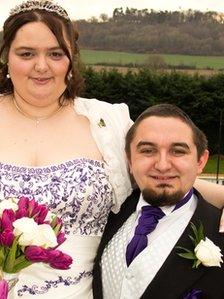
Paul Lewis and his wife on their wedding day
I have brittle bones.
My wife and I got married in January this year. We met my wife through online dating and I know we spoke a lot about my disability and what I could and couldn't do.
I see myself as a very independent person, I drive, play guitar, work and play cricket I feel that people's perceptions can be very out of place or just unknown.
The fear factor is a major issue I found to begin with and luckily my wife wasn't one of those people who was afraid to ask the awkward questions, without being malicious or patronising.
Can't wait to see what this series holds.
Jenny, Taunton, UK
My husband's disabled but so what? I knew he was disabled before we met. He didn't broadcast it but he didn't hide it either. He has a wonderful personality and a zany sense of humour and I wouldn't swap him for anyone else.
My husband's disability? He's an amputee with spinal stenosis [a narrowing of the spinal canal]. We both know he'll be in a wheelchair permanently one day but we'll cross that bridge as and when we get to it.
His disability does annoy him sometimes because he can't do the things he once could but it doesn't worry me. Most of the time I can do the things he finds difficult or our daughter will help out.
James MacDonald, Exeter, UK
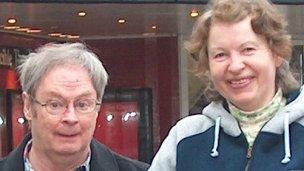
James MacDonald has been married 11 years
I was born with cerebral palsy and had to wait 52 years before marrying virtually the first woman I ever went out with. Eleven years later we are still married.
The hard part, as your interviewees demonstrate, isn't disability, it's squaring one's atypical experience with what other people consider normal.
The important thing for everyone to realise, if they can, is that any full life is worthwhile, whatever the different criteria.
Dave Hollings, Darwen, UK
My wife is deaf and has been deaf since birth. Before we met, I had never talked with a deaf person, let alone dated one.
We met in Sainsburys and, despite the initial difficulties in communication, we hit it off and we found a way through. In many of our early dates we were writing things down on pieces of paper.
Five years later, I am fluent in British Sign Language (BSL) and we have three wonderful children, the oldest two of whom are already bilingual in English and BSL.
I don't see my wife as disabled. She just happens to be deaf.
Jason Etherington, Rotherham, UK
I am a dwarf. I am 28 and never been in a relationship. It didn't used to bother me but now it does. I see my friends all settling down and there's me.
People need to be more open-minded about disabilities and look through that. Because scratch beneath the surface and I have a great personality, wicked sense of humour and am caring.
Marilyn, Austin, USA
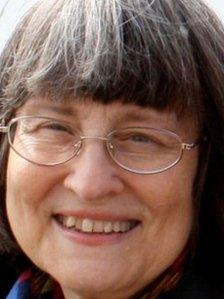
As an older disabled woman, who dated long ago and found the right match (one that has lasted for a couple of decades), my advice to any disabled person is to be perfectly honest about who you are - your abilities, your strengths, and your limitations - when you are presenting yourself to others.
You want to "pre-filter" your possibilities, and focus in on the folks who will be comfortable with you as you are.
The folks who are going to be turned off by you needn't apply.
And be honest with yourself, too - don't sell yourself short and overlook your good points just because you have problems in some areas.
No one is perfect!